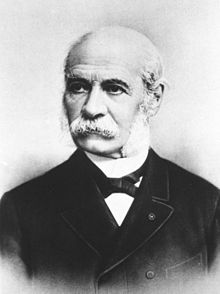| Revision as of 10:20, 7 January 2014 editArjayay (talk | contribs)Autopatrolled, Extended confirmed users, Page movers, Pending changes reviewers, Rollbackers625,383 editsm Sp – Refrences > References← Previous edit | Revision as of 01:48, 5 March 2015 edit undoSer Amantio di Nicolao (talk | contribs)Autopatrolled, Administrators6,252,162 edits →References: add category using AWBNext edit → | ||
| Line 38: | Line 38: | ||
| ] | ] | ||
| ] | ] | ||
| ] | |||
Revision as of 01:48, 5 March 2015

Paul Alexandre René Janet (30 April 1823 – 4 October 1899) was a French philosopher and writer.
Biography
Born in Paris, he became professor of moral philosophy at Bourges (1845–1848) and Strasbourg (1848–1857), and of logic at the lycée Louis-le-Grand, Paris (1857–1864). In 1864 he was appointed to the chair of philosophy at the Sorbonne, and elected a member of the academy of moral and political sciences.
He wrote widely on philosophy, politics and ethics, on idealistic lines: La Famille, Histoire de la philosophie dans l'antiquité et dans le temps moderne, Histoire de la science politique, Philosophie de la Revolution Française, etc. However, in the opinion of 1911 Encyclopædia Britannica, these writings are not characterised by much originality of thought. In philosophy he was a follower of Victor Cousin, and through him of G. W. F. Hegel. His principal work, Théorie de la morale, owes much to Immanuel Kant.
Works
- The Materialism of the Present Day, a Critique of Dr. Büchner's System ISBN 1152057863
Notes
| This article includes a list of references, related reading, or external links, but its sources remain unclear because it lacks inline citations. Please help improve this article by introducing more precise citations. (January 2014) (Learn how and when to remove this message) |
References
 This article incorporates text from a publication now in the public domain: Chisholm, Hugh, ed. (1911). "Janet, Paul". Encyclopædia Britannica (11th ed.). Cambridge University Press.
This article incorporates text from a publication now in the public domain: Chisholm, Hugh, ed. (1911). "Janet, Paul". Encyclopædia Britannica (11th ed.). Cambridge University Press.